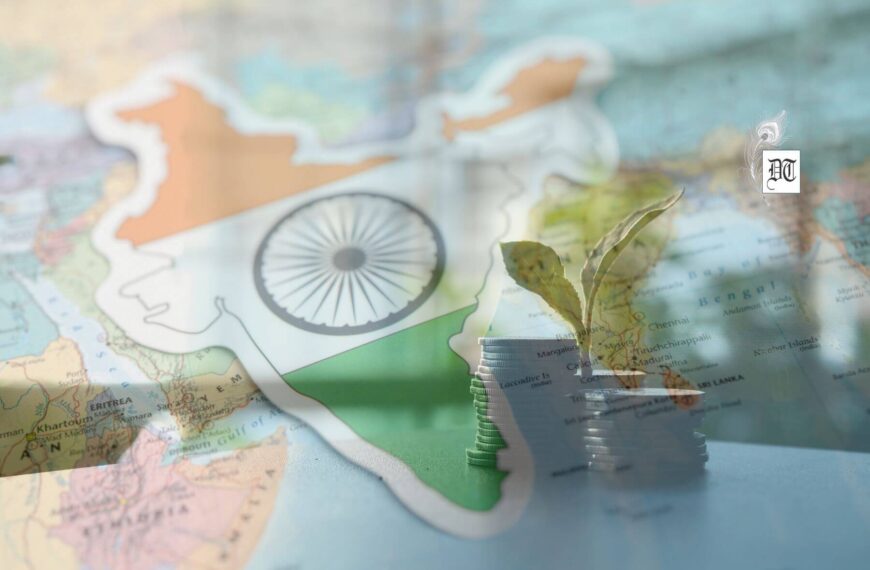Black money is something earned legally, but which has escaped the taxes. Illegal money is something, which is a result of illegal activities. No question of taxes arises here. This is an important distinction, opines Tarun, in his weekly column, exclusively in Different Truths.
Black money is the hottest topic in India right now. It is hot because of the financial reforms unleashed by the government. And these reforms are aimed at cutting at the roots of so called “black” money, or the parallel economy in India. Yet, the problem has refused to go away, even after India has undergone a lot of pain to get rid of this problem. We have had a demonetisation exercise, and now GST regime to deal with this. I wish to explore this a little more specifically.
Let me begin by defining black money. In simple terms, it is earned money, which has escaped taxes  either by design or inadvertently. The black money definition does not include income that was exempt from taxes by the government in the first place. Examples of exempt income include agriculture, exports, etc. By design, we can understand that the taxpayer uses tricks to escape taxes. But there is another problem – inadvertent. This is easily understood if one tries to sell one’s property in India. The consideration is paid, as a matter of standard practice, in both cash and cheque. The cash portion is the one that escapes taxes.
either by design or inadvertently. The black money definition does not include income that was exempt from taxes by the government in the first place. Examples of exempt income include agriculture, exports, etc. By design, we can understand that the taxpayer uses tricks to escape taxes. But there is another problem – inadvertent. This is easily understood if one tries to sell one’s property in India. The consideration is paid, as a matter of standard practice, in both cash and cheque. The cash portion is the one that escapes taxes.
The fight is truly on. Since cash portion escapes taxes, the government has been trying to limit the use of cash in the economy.
All of this is easily understood. Let’s move a little beyond. We come to illegal money. Illegal money may be defined as money earned from illegal activities, like gambling, smuggling, trade in banned items, etc. I make a distinction between black money and illegal money. Black money is something earned legally, but which has escaped the taxes. Illegal money is something, which is a result of illegal activities. No question of taxes arises here. This is an important distinction. Black money harms the government directly, and the society indirectly, as the money is not properly channelised towards needs of the society. But illegal money harms the very fabric of the society, as it promotes vices. So, black money is somewhat lesser black than illegal money.
 But, the question arises as to why and where from the black money comes. When currency is issued by the RBI, it is all white. It has to be, as RBI is all white only. The first recipient of that currency is still labelled as all white. After that, the money may become black when it escapes tax. Again, when the money goes back to RBI, or banking system, it is white. So, the money is black in between both the processes. That means something happens which allows white money to become black. And what is that something? The many exemptions are the escape routes that allow for the conversion of money. In the USA, the income tax is levied even on an income of $1. Here in India, we are given exemption of a few lakh rupees before the first slab kicks in. This same route was used by many during demonetisation to convert their black money back to white.
But, the question arises as to why and where from the black money comes. When currency is issued by the RBI, it is all white. It has to be, as RBI is all white only. The first recipient of that currency is still labelled as all white. After that, the money may become black when it escapes tax. Again, when the money goes back to RBI, or banking system, it is white. So, the money is black in between both the processes. That means something happens which allows white money to become black. And what is that something? The many exemptions are the escape routes that allow for the conversion of money. In the USA, the income tax is levied even on an income of $1. Here in India, we are given exemption of a few lakh rupees before the first slab kicks in. This same route was used by many during demonetisation to convert their black money back to white.
High rates of indirect taxation are tempting people to do away with invoice while buying goods. Another thing is complexity. One fails to understand the rationale for 5 slabs in GST. No officer or minister or group in the world can satisfactorily and equitably divide goods into 5 slabs. If only two slabs were made, then GST would have been better. The filing of returns every month is a nightmare.
The government has used the example of hawai chappal (flip-flop) and Mercedes to justify having a multiple tax structure. They also say that they will bring down rates of taxation after sufficient increase in their tax revenue.
The socialist cause of equity is addressed by multiple slabs in direct taxes. Indirect taxes are more to release the animal spirits of the economy, to maximise productivity in the economy at a given point of time, to give direction to the long term production lines of the economy. Even China has dropped socialism from their trade and manufacturing.
So, any black money generated due to improper financial policies is not that black, is it?
Please note that this column does not endorse black money at all. It is just an attempt to explore the cause of untaxed incomes. This is to get other perspectives that are commonly understood, so that, black money can be eradicated from the economy for ever, and the people also do not suffer hardships in the process.
Black money can be eradicated through simple tax structure, easy compliance, and lower rates of taxes. Hong Kong is one of the most advanced economies in the world, and it has managed to remain corruption free, as it is also one of the least taxed economies. Higher taxes lead to higher tax evasion and higher corruption in the process. Just remove the incentive to avoid taxes. Do not allow the tax to show on the invoice, and this takes away the incentive to avoid taxes.
And that is when we will have a proud all white economy.
©Tarun Gupta
Photos from the Internet
#BlackMoney #Tax #MoneyEscapedTax #RBIMoney #ShadesOfMoney #BareFootEconomist #DifferentTruths



 By
By

 By
By
 By
By